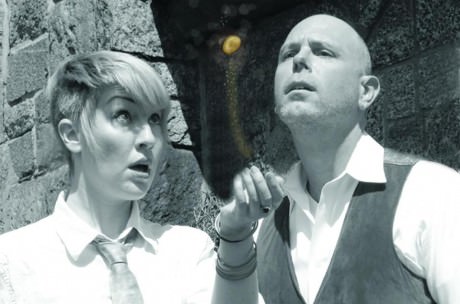The aptly named Infinite Jest presents an amusing, engaging and ultimately even touching production of Tom Stoppard’s absurdist peek behind the scenes of Hamlet – Rosencrantz and Guildenstern Are Dead. As Guildenstern – or is it Rosencrantz? – says, “words – they’re all we have to go on,” and that is particularly true of this spare production.
The play actually premiered at the Edinburgh Fringe 46 years ago, and seems equally at home in the Redrum Theater, and on James Finley’s set design – on a thrust stage, with two black cubes the only furniture and plain white flats framing an upstage center entrance. (More awareness of sightlines on the thrust stage, and one more flat to mask the slightly distracting tiptoeing of Claudius’ court off to the green room would have been nice. The producers also might want to print up more programs if they get a chance; Rosencrantz is misspelled inside.) The lighting and sound (operated by Maggie Clifton) were non-obtrusive but effective in the first half, later nicely evoke both the feeling of waking up disoriented on a boat at night and the main characters’ dawning realization of their fate. Overall, the minimalist set and lighting capture the sense of limbo that pervades R & C’s situation.

Mundy Spears (Rosencrantz), and Bill Gordon (Guildenstern), are close to perfect. In a show that revels in language, their excellent diction, nearly flawless delivery and impeccable timing are a joy. (Even on opening night, there was only one barely perceptible line flub between them, no mean feat with Stoppard). Their delightful game of ‘Questions’ and their philosophical tennis matches make their shift into more serious existential discussions and their growing perplexity and fear all the more affecting. They did start the play slightly stilted, as if playing to the balcony in a much larger theater, but that could have been a first-night flaw. Or this might be a choice on director Kari Ginsburg’s part, in which case this might be “not a criticism, only a matter of taste,” as Rosencrantz says – or is it Guildenstern?
Jeffry S. Clevenger (The Player), just possibly surpasses the title characters. He delivers his lines, even the most theatrical or philosophical, with an easy, natural flair. His troupe of Tragedians (Stephen Hock, Alani Kravitz and Christopher Herring) make a great deal of very little to tremendous comic effect, particularly in a hysterical game of pornographic patty-cake.
The fault of the play, if it has one, lies not in in its stars, but in its underlings. Hamlet (Sam Taylor) and Ophelia (Emily Webbe) seem pleasant but inexperienced, and Hamlet does not come across as one who could outwit R & G, despite their confusion. The rest of the court are amusing: Claudius (William Aitken) as a redneck king in an Elvis t-shirt and leather jacket; Gertrude (Kim Pyle) a leopard-print lush; and Polonius (Mary Suib), funniest of the lot as some sort of senile escapee from The Golden Girls – but their line deliveries do not seem quite clear or convincing enough to make the needed connections back to the play itself. Ginsburg’s other non-traditional choices, from the minor details: contemporary costumes (including giving R & G frivolous touches of orange while the Players had purple) to the major: a female Rosencrantz (still referred to as “he”), added spice to the production without distracting.
So, for Rosencrantz and Guildenstern Are Dead – get thee to the Redrum, go, and quickly, too.
LINK
For more information about the show and to purchase tickets read our Fringe Preview.




